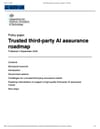⚡ Quick Summary
The UK’s Department for Science, Innovation & Technology (DSIT) outlines a roadmap to establish a trusted, high-quality, third-party AI assurance market. Aimed at scaling confidence in AI systems, the document proposes a multi-stakeholder approach to professionalising the industry, improving skills, standardising access to system information, and driving innovation. With a market valued at over £1B in 2024 and projected to reach £18.8B by 2035, the UK aspires to become a global leader in AI assurance, capitalising on its strong professional services ecosystem. The roadmap presents immediate government actions and long-term infrastructure plans to develop a thriving AI assurance economy.
🧩 What’s Covered
This 21-page policy paper is structured into six key sections:
- Ministerial Foreword & Introduction
- Emphasises AI’s economic potential and the need for trustworthy assurance to enable adoption.
- Presents AI assurance as vital for enabling responsible AI deployment across public and private sectors.
- Government Actions
- Professionalisation: DSIT will convene a UK consortium to create a future AI assurance profession with a voluntary code of ethics and a skills framework.
- Skills: The roadmap acknowledges current gaps and highlights planned work with the Alan Turing Institute to define AI auditor competencies .
- Information Access: Government will define best practices for data sharing between assurance providers and system developers.
- Innovation: A new £11M AI Assurance Innovation Fund will launch in 2026 to support novel assurance mechanisms .
- Challenges for a Trusted Market
- Quality: Lack of standardised assurance tools; 38% of AI governance tools may use harmful metrics.
- Skills Shortage: Lack of clear career paths, training, and workforce diversity.
- Information Access: Developers’ reluctance to share sensitive information inhibits auditing.
- Innovation Barriers: Few forums or incentives exist for collaborative R&D.
- Interventions to Support the Market
- Presents three quality assurance models:
- Professional Certification: Individual-based qualification.
- Process Certification: Standardisation of assurance workflows.
- Accreditation: Organisational-level validation via UKAS (e.g., ISO/IEC 42001 trials) .
- Presents three quality assurance models:
- Skills Deep-Dive
- Turing Institute research shows auditors need technical, governance, and sector-specific knowledge.
- Existing certifications (e.g., IAPP AIGP) are useful but insufficient.
- Lack of practical training drives firms to rely on in-house upskilling.
- Next Steps & Call for Engagement
- Stakeholder collaboration is encouraged.
- Contact provided via: ai-assurance@dsit.gov.uk.
The roadmap also references UK and international initiatives, such as Singapore’s AI Verify Foundation and BSI’s AA&DT services .
💡 Why it matters?
The UK Government is signaling serious intent to formalise the third-party AI assurance landscape—an essential component of safe AI deployment. Unlike self-assessment or developer-led testing, trusted third-party assurance enables independent verification, boosting market and public confidence. By proposing a professionalisation pathway (mirroring cybersecurity’s evolution), the roadmap addresses market fragmentation and skills scarcity while laying groundwork for international credibility. Crucially, it anchors assurance as an enabler of responsible innovation, aligning with both economic and ethical priorities in the AI governance agenda.
❓ What’s Missing
- Regulatory Alignment: The roadmap acknowledges the EU AI Act but lacks concrete steps for interoperability with EU or US regimes.
- Sector-specific Guidance: No tailored pathways for high-risk sectors (e.g., health, finance) where assurance needs vary.
- Timeline Ambiguity: Beyond the 2026 innovation fund launch, milestones are vague. No projected date for a professional certification rollout.
- Public Sector Use: While discussed broadly, there’s no commitment to mandatory third-party assurance in government AI procurement.
👥 Best For
- Policy Makers & Regulators building assurance frameworks.
- AI Assurance Startups looking to shape standards or secure innovation funding.
- Large Enterprises seeking reliable external audit services.
- Academia & Training Providers aiming to fill skill gaps.
- Ethics & Governance Professionals interested in codifying good practice.
📄 Source Details
- Title: Trusted Third-Party AI Assurance Roadmap
- Author: UK Department for Science, Innovation & Technology (DSIT)
- Published: 3 September 2025
- Available at: gov.uk
- License: Open Government Licence v3.0
📝 Thanks to
Department for Science, Innovation & Technology (DSIT)
Alan Turing Institute
UKAS
BCS – The Chartered Institute for IT
World Privacy Forum
Singapore AI Verify Foundation
BSI Group
IAPP – AI Governance Professional Certification


